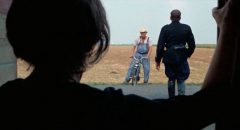
With volume 3 of their World Cinema Project box sets, Criterion has released another treasure trove of largely unknown (in the West) features spanning five decades and six countries, from the Expressionist horror of Mexico’s Dos Monjes (1934) to the Neo-realist horrors of life on Brazil’s streets in Héctor Babenco’s Pixote (1980), with stops in between in Indonesia, Iran, Mauritania and Cuba.








